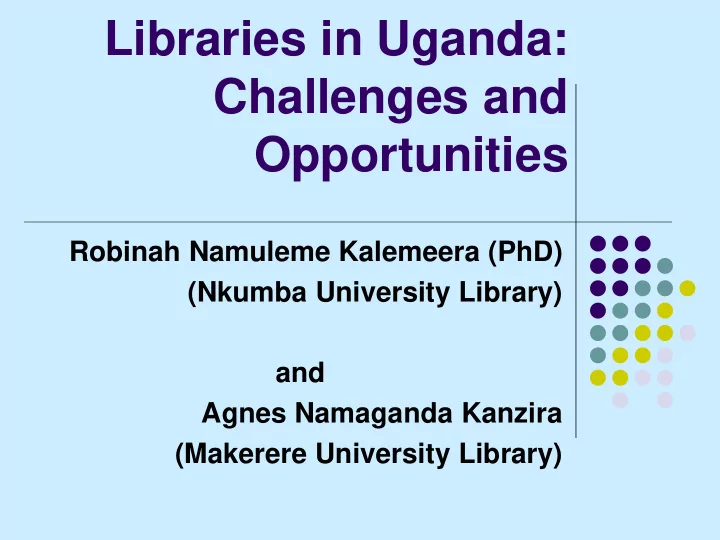

Services in Academic Libraries in Uganda: Challenges and Opportunities Robinah Namuleme Kalemeera (PhD) (Nkumba University Library) and Agnes Namaganda Kanzira (Makerere University Library)
Overview • Introduction • Literature Review • Methodology • Findings • Conclusion and Recommendations
Introduction Support for research is in line with the overall mission of the • university. Research is a major indicator of university performance • Academic libraries support researchers with a range of services • including the development of research collections; and the provision of reference, information and instruction services. New and innovative library services such as bibliometric • analysis, research data management and partnerships /collaborations are emerging in response to technological, political, economic and social changes.
Purpose The study aimed at investigating: • The existing research support services; • Challenges in offering research support services in academic libraries in Uganda; • Opportunities/Planned research support services
Literature Review Technology, library space and design, and dynamic user services have emerged as strong drivers for change in academic libraries. (Corrall, S., 2012; Jubb, M, 2011; Raju, R. and Schoombee, L., 2013) Studies of library support services have been conducted in developed countries, but limited investigation of the situation in the developing countries.
Methodology Review of related literature A case of CUUL member institutions 31 paid-up Academic libraries Librarians responsible for research services were identified and sent Email messages Online Questionnaire survey analysed using descriptive statistics
Responses Type of Universities CUUL Number % Institution in Uganda member of responses Public 9 6 6 67 Universities Private 30 25 10 40 Universities Total 39 31 16 52
Findings: New Services Bibliometrics training, citation reports and calculations of research impact Open access publishing and/ or self-archiving (Institutional Repositories) Research Data Services Data Literacy training Dedicated library spaces ( Research commons, Multimedia rooms, Seminar rooms, etc ) Web tools
Challenges Inadequate ICT infrastructure Inadequate IT skills Power fluctuations Low bandwidth
Recommendations
For Library managers & Librarians • Support and promote staff development by providing appropriate training opportunities • Acquisition of new skills and knowledge – beyond the traditional librarianship skills • Review of roles of lbrarians and streamline processes • Stronger relationships between librarians and researchers
Acknowledgement CUUL Executive for the support Respondents Institutions for the support
Thank you for your attention Author Contacts • namulemerobinah@gmail.com • agnama@mulib.mak.ac.ug/ namaganda.agnes@gmail.com
Recommend
More recommend